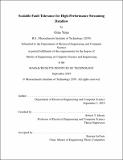Scalable fault tolerance for high-performance streaming dataflow
Author(s)
Yuan, Gina,M. Eng.Massachusetts Institute of Technology.
Download1145279777-MIT.pdf (1.426Mb)
Other Contributors
Massachusetts Institute of Technology. Department of Electrical Engineering and Computer Science.
Advisor
Robert T. Morris.
Terms of use
Metadata
Show full item recordAbstract
Streaming dataflow systems offer an appealing alternative to classic MySQL / memcached web backend stacks. But websites must not go down, and current fault tolerance techniques for dataflow systems either come with long downtimes during recovery, or fail to scale to large deployments due to the overhead of global coordination. For example, in the failure of a single dataflow node, existing lineage-based techniques take a long time to recompute all lost and downstream state, while checkpointing techniques require costly global coordination for rollback recovery. This thesis presents a causal logging approach to fault tolerance that rolls back and replays the execution of only the failed node, without any global coordination. The key to knowing how to replay a valid execution while ensuring exactly-once semantics is a small, constant-size tree clock piggybacked onto each message, incurring runtime overheads that are low and scalable. After recovery, the state of the system is indistinguishable from one that never failed at all. We implement and evaluate the protocol on Noria, a streaming dataflow backend for read-heavy web applications. Compared to Noria's original protocol of lineage-based recovery, tree clock recovery time is constant in relation to state size and graph size. Experimental results show sub-second recovery times with 1.5ms runtime overheads, which translates to a 290x improvement in recovery time.
Description
This electronic version was submitted by the student author. The certified thesis is available in the Institute Archives and Special Collections. Thesis: M. Eng. in Computer Science and Engineering, Massachusetts Institute of Technology, Department of Electrical Engineering and Computer Science, 2019 Cataloged from student-submitted PDF version of thesis. Includes bibliographical references (pages 55-57).
Date issued
2019Department
Massachusetts Institute of Technology. Department of Electrical Engineering and Computer SciencePublisher
Massachusetts Institute of Technology
Keywords
Electrical Engineering and Computer Science.